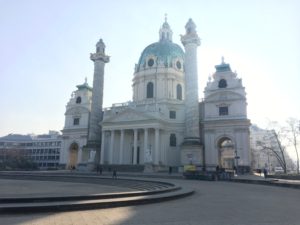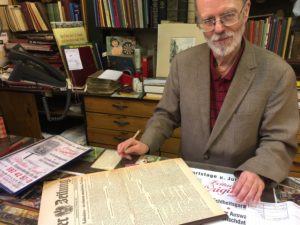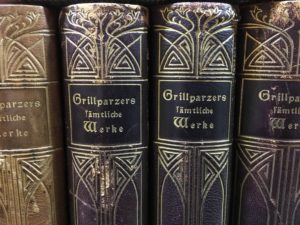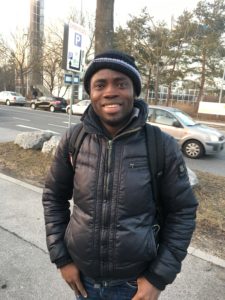I’m a romantic. Actually, that’s an understatement. I’m a ROMANTIC.
So, it was cool to walk the streets of Vienna on Valentine’s Day. I saw men and women all day carrying bouquets of roses and boxes of chocolates. Smiles abounded. Love was in the air. And where love is strong–kindness and compassion are close at hand. People who are in love tend to be a little nicer than normal, I’ve found.
I actually found some kindness the night before.

Vladimira is from Bulgaria. She’s been living in Vienna for three and a half years and has been working at the Arion Cityhotel for that time.
After a night in a hostel/hotel in Salzburg (the Meininger is a really nice hostel by the way) and a long road trip, I checked into a hotel about 15 minutes outside of the city’s center. The Arion Cityhotel provided me with a nice rest. The woman who checked me in is named Vladimira. (I’m pretty sure she is the first Vladimira I’ve ever met.) I was dead beat tired and hungry but didn’t feel like going out. Vladimira helped me to order some good take-out food, translating with the people at the restaurant. I could tell that she had had a long day, but she still went above and beyond. Everyone else at the Arion Cityhotel proved to be just a professional and helpful.
So, when I got up on Valentine’s Day, I was rested and ready to head into the heart of Vienna.
I caught a bus downtown and immediately started looking for some food and coffee. Priorities, people. Just saying.
I not only found coffee. I found my first cool conversation for the day. I met Ionut (it’s pronounced Unitz and I don’t have the appropriate key to underscore the “t” as I should). Ionut works as a barista for Espressa Mobil. It’s like a food truck, except it’s coffee. That’s just brilliant!
Ionut is Romanian and has been living in Vienna for about 6 months. He came here because he had family living and working here. While he came for the work, he’s really come to love the city and its people.

Ionut is a proud Romanian who has found real sense of appreciation for Vienna and her people.
“Vienna is lovely and beautiful. Being in this city with so much history is nice. You can feel the history. And the people are respectful. They don’t lack education. They respect human beings, and they don’t care about social status.”
When I was in Amsterdam, I witnessed a massive protest that dealt with corruption in the Romanian government, so I asked Ionut about it.
He told me that when the socialist party was elected to power that they had tried to modify the law to make it easier for governmental officials to steal from the public coffers. It would even be retroactive, ending any current legal action against corrupt officials.
“The beautiful thing about this is that Romanian people all over the world are uniting in protest,” Ionut explained. He even showed me a picture of a protest in Romania itself where the protesters used colored shirts and lights to create a massive image of the Romanian flag. (Here’s a link to it.)
I had really enjoyed my conversation with Ionut and I was properly caffeinated, so I started walking the city and tried to absorb some of that history.

Karls Kirche (St Charles Church) is a beautiful work of architecture and art.
I didn’t have to walk far to find Karls Kirche (St. Charles Church), a beautiful cathedral that sits before one of Vienna’s many public parks. When I went it in, I discovered that you could take a tour of the church for a minimal price.
Not only did I get to walk through it. I took an elevator to the scaffolding at the top, which gave me access to a view of the entire city from the tip of the dome. It reminded me of Il Duomo in Florence.
There was a cool new feature that I’ve never seen offered in a cathedral before. They had a virtual tour with a headset. (I’m a gamer and appreciate good graphics. I view it as another form of art. The virtual tour reminded me of Assassin’s Creed II, which is set in Florence.)
There are a lot of images of both the exterior as well as the interior of St. Charles in the slideshow at the bottom of the post.
As I continued my walk, I discovered the Vienna City Park, which is charming. There are statues of Schubert and Strauss, relaxing paths, a playground area, and a duck pond.
Now, I told you that I was a romantic, and I had noticed the couples. But I’m also a lover of literature, and there was one work that I started thinking about that I just associated with Vienna–The World According to Garp by John Irving. The protagonist is a writer who moves to Vienna to find his voice. He writes his greatest work here.
When I was in college, my friend, Joel, and I went searching through New Hampshire and Vermont for author who penned Garp. It was a great adventure. We visited his old school, and inadvertently found a Book Barn next to an apple orchard in the country. Literally, it was a barn full of books.
As I sat in the Vienna City Park thinking about Garp and Joel and the book barn, I knew what I wanted. I wanted to find a bookstore, and I wanted to see if I could find a copy of The World According to Garp. (I had reread it this past fall and gave it to my friend Michael.)
And that’s how I met Herr Ferner.

Herr Ferner works at Bucher Ernst. He loves to share Vienna and its culture with visitors.
Mr. Ferner works at Bucher Ernst, der Antiquar. When I first met him, he was at the smaller location next to Dr. Karl Lueger Platz. He didn’t know The World According to Garp, but he showed me some of the small selection of works they had that were written in English. We talked about the blog, and I asked if I could write about the store. He said that I should visit the main store, located in another section of the city. He said it was much larger and had a better selection.
So, off I went in search of a bigger barn.
When I emerged from the underground, I found myself in a section of Vienna that felt more like Time Square in New York. It was a massive shopping district and crowds milled and merged and swam about and through one another. It was a sea of bodies and commerce.
I went into the first shop I saw (they sold bras) and told them that I was looking for books. The ladies pointed me in the right direction, and I started swimming through the main thoroughfare. Eventually, I found a side street that felt like the right direction and started down it.
I didn’t find Bucher Ernst there. I found lunch.

This Cordon Bleu and salad was filling and quite tasty, but you should go to the G’schamster Diener to enjoy the decor.
I saw a quirky sign that looked like it was associated with authentic Austrian cuisine. And I was right. G’schamster Diener is really an amazing little gem.
I felt more like I was sitting in someone’s den or a parlor of old. There were a number of elderly people there, which told me that this was a local favorite. And there was a table of seven people that almost seemed like a group of graduate students. They would sit listening to the conversation of an old man and woman and stared intently at one another and then would burst out laughing. I had no idea what was so funny, but I enjoyed watching it all as I ate my Cordon Bleu (made with a pork instead of chicken) and drank my beer.
After I was well-sated, I continued my search and soon found the main location of Bucher Ernst. I laughed when I walked in because Herr Ferner was standing there. It was like he had a magical cabinet that linked the two shops. (Too Harry Potter?)
He showed me around and told me more about what makes Vienna so special. He said that Austria was mixture of eastern and western cultures, and that mixture is most evident in Vienna. Like most big cities, Vienna is a melting pot of Bulgarian, Czech, German, and Italian influences. (I’m sure I could add extensively to that list today. I saw signs in Turkish, Arabic, and Korean.)
Both locations of Bucher Ernst offer more than just used books. They deal in antiques of all sorts. I saw old records, copies of Rolling Stone and Playboy for the 1970s and 80s, and even some unusual photo albums that looked like they were produced in the 1950s. Mr. Ferner told me that their main specialty was century old newspapers. They have an extensive archive on the second floor of their main location.
He told me that it’s gotten more difficult to keep an old bookstore and antique shop alive today.
“The permanent struggle is that the cultivated people don’t have enough money to buy the high-end items and those who have the money lack the cultivation,” he said with a laugh.
I noticed one name on the book shelves that caught my eye–Grillparzer. Garp’s great literary feat in Irving’s novel is “The Grillparzer Pension.” What I didn’t know when I read Garp was that Grillparzer is the name of one of Austria’s most renowned authors.

Hanz Grillparzer is a big part of Austria’s literary heritage and clearly provided inspiration to John Irving.
Mr. Ferner told me that Grillparzer was able to write about all of the people, no matter what their economic or cultural status. He told me that one of Grillparzer’s great works was his version of Euripides’ Medea. He said that Grillparzer could make you feel something real for any of his characters and that he had a great sense of humor.
I started laughing. I realized that as much as I loved John Irving’s work that I still didn’t really get it all. Irving clearly knew of Grillparzer, and his style is similar to that of the famous Austrian author. I expect that he read some of Grillparzer’s work. After all, like Garp, Irving lived in Vienna for a while.
I love discovering new things in old waters. It reminds me of how much I truly don’t know.
I thought my adventure was done for the day, but I promptly realized that I had gone about 5 kilometers away from where the bus had dropped me that morning.
I finally got some good directions and hopped on a streetcar that would take me near the hotel. When I got off, I asked for some help so that I could orient myself, and that’s how I met Emmanuel from Nigeria.

Emmanuel is studying psychology in Vienna, but he plans to return to his home of Nigeria when he’s done.
Vienna was not done with me.
Emmanuel and I walked for about a block and talked. He told me that he was studying psychology at a university in Vienna. (His brother is actually studying at a university in Alabama.) I thought that it was cool that he was studying psychology in Vienna because this is also the home of Sigmund Freud.
Emmanuel’s been here three years, and, in that time, he’s become fluent in German.
“I have a love for languages. I’m open to new things and new perspectives. I just love to adapt.”
He’s here in this beautiful city, but his heart is in Nigeria.
“There’s no place like home. Life at home is not comparable to anywhere else in the world,” Emmanuel declared.
I thought about Vladimira from Bulgaria, Ionut from Romania, Emmanuel from Nigeria, and Mr. Ferner’s comments about Vienna. I thought about John Irving and about T.S. Garp. I thought about myself.
I wondered how much of a place we take with us and how much of ourselves we leave.
I’m not sure what the answer is, but I can say that it was one hell of a day.
To all the lovers out there, Happy Valentine’s Day!
Until my next post, keep looking to the heavens and seeking your own star.
(I really wanted to play “When I’m 64” by The Beatles with this video, but I can’t because of copyright issues. I encourage you to mute the music and play it as you watch, especially if you’ve seen the film version of The World According to Garp starring Robin Williams. I’m going to go with the opening of Beethoven’s 9th Symphony: Ode to Joy instead.)
